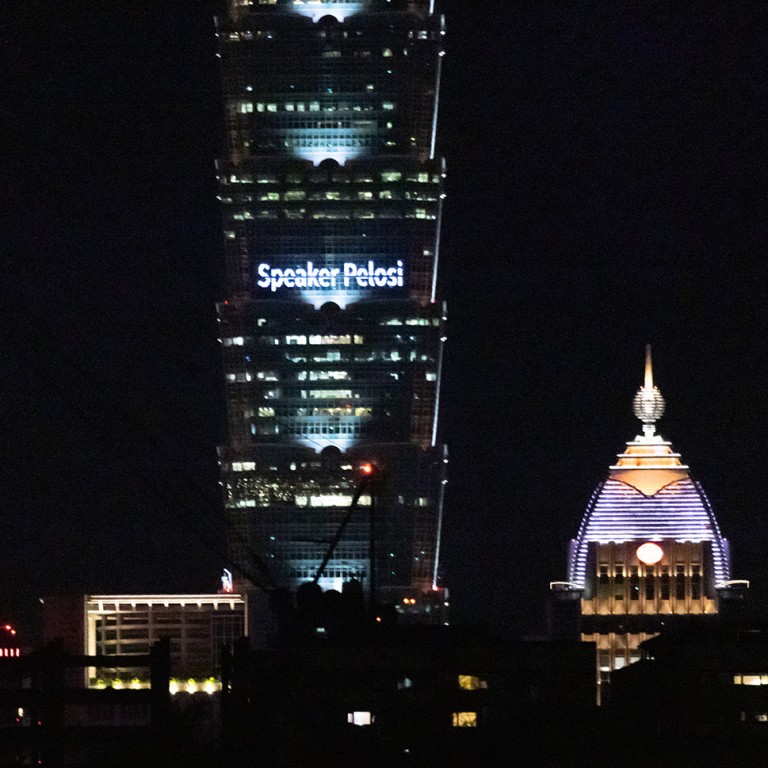
Nancy Pelosi explains her Taiwan trip as vital to defence of democracy and freedom
- Moments after the US speaker of the House lands in Taipei, The Washington Post publishes an essay in which she outlines the reasons for her visit
- She cites ‘Beijing’s abysmal human rights record and disregard for the rule of law … as President Xi Jinping tightens his grip on power’
US Speaker of the House Nancy Pelosi said her trip to Taiwan is a signal to the world that Washington stands with the self-governed island’s “vibrant, robust” democracy and has a “sacred vow” to support its defence amid growing threats from Beijing.
“We cannot stand by as the CCP proceeds to threaten Taiwan – and democracy itself,” she said. “By traveling to Taiwan, we honor our commitment to democracy: reaffirming that the freedoms of Taiwan – and all democracies – must be respected.”
Her trip comes at a highly tense moment for Washington, Beijing and Taipei.

As she arrived at Songshan Airport in Taiwan’s capital, China’s military announced that it would conduct live-fire military drills around Taiwan’s perimeter in the coming days.
In recent months, China has also sent hundreds of military jets buzzing by Taiwan’s air defence zone, and 21 more planes entered on Tuesday, according to Taiwan’s Ministry of National Defence.
Beijing claims Taiwan as its own territory, and has threatened the use of military force to take control of the island.
US policy on Taiwan is guided by three documents: the 1972 Shanghai communique, in which the US said it “acknowledges” the Chinese view that Taiwan is a part of China; the 1979 Taiwan Relations Act, which requires the US to help Taiwan defend itself; and the 1982 Six Assurances, which states that the US “would not formally recognize Chinese sovereignty over Taiwan”.
Why is a visit to Taiwan by US House Speaker Nancy Pelosi controversial?
In her essay, Pelosi also said: “America’s solidarity with Taiwan is more important today than ever – not only to the 23 million people of the island but also to millions of others oppressed and menaced by the PRC.”
She linked US support for Taiwan and her trip to Taipei directly to Russia’s invasion of Ukraine, describing it as another front in a global battle between authoritarianism and democracy.
“As Russia wages its premeditated, illegal war against Ukraine, killing thousands of innocents – even children – it is essential that America and our allies make clear that we never give in to autocrats,” she said.
Pelosi travelled to Kyiv, the Ukrainian capital, in April, and was supposed to visit Taipei the same month, but had to postpone the trip after testing positive for the coronavirus.

Pelosi also said that the situation in Taiwan had become more urgent because of Beijing’s tightening grip on civil society in Hong Kong, and its hardline policies targeting ethnic minorities and political dissidents.
She said that Beijing’s “brutal crackdown” against freedoms and rights in Hong Kong had “cast the promises of ‘one-country, two-systems’ into the dustbin”.
Taiwan is the third stop in Pelosi’s trip across Asia, after Singapore and Malaysia. She is accompanied by five other lawmakers, all House Democrats. They are also scheduled to visit South Korea and Japan.
“Our discussions with our Taiwanese partners will focus on reaffirming our support for the island and promoting our shared interests, including advancing a free and open Indo-Pacific region,” Pelosi wrote.
Her trip has brought out substantial support from lawmakers in both parties in Washington, including many Republicans who normally fiercely oppose her.
A joint statement signed by 26 Senate Republicans said that Pelosi’s trip was consistent with the long-standing precedent of members of Congress visiting Taiwan, and was not a violation of US policy towards the island.
Pelosi said in her essay that the US “continues to oppose unilateral efforts to change the status quo”.
She is the first House speaker to visit Taiwan since Newt Gingrich travelled there in 1997, and has been a strident critic of Beijing’s human rights record for as long as she has been a member of Congress.
Over the years, she has had numerous disputes with presidents from both political parties on China issues.
According to Molly Ball, author of a biography about Pelosi and a journalist at Time magazine, Pelosi was “sharply critical” of President Bill Clinton when he decided not to base Chinese trade on human rights improvements in China.
“It wasn’t necessarily in her political interest, either – a lot of Chinese business interests in her district opposed her stance,” Ball wrote in 2020. “She called it a matter of ‘ideals versus deals.’”
In 1991, during a visit to Beijing, she sneaked onto Tiananmen Square, the site of the bloody June 4 crackdown on student protesters two years earlier, unfurled a small banner that said “To those who died for democracy in China” and was accosted by Chinese police.
“Since then,” she wrote in her essay on Tuesday, “Beijing’s abysmal human rights record and disregard for the rule of law continue, as President Xi Jinping tightens his grip on power.”
“We must stand by Taiwan,” she added, “which is an island of resilience.”

